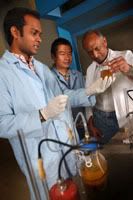Eight countries create sugarcane bioproducts and bioenergy consortium
 Earlier we reported on the great potential of sugarcane as a crop from which many (non-fuel) bioproducts can be made, such as bioplastics, detergents, tinctures, drugs, glues, gels, and even biopolymers resembling nylon (earlier post). Now as a result of an initiative by the Mauritian Sugar Industry Research Institute (MSIRI), eight countries have decided [*French] to form an international research and technology consortium aimed at increasing the use of sugarcane biomass for energy. Cooperation will go beyond research into ethanol production, which is now well established, and will therefor focus on using byproducts (bagasse, vinasse, molasses) to produce new liquid biofuels, energy and high-value bioproducts.
Earlier we reported on the great potential of sugarcane as a crop from which many (non-fuel) bioproducts can be made, such as bioplastics, detergents, tinctures, drugs, glues, gels, and even biopolymers resembling nylon (earlier post). Now as a result of an initiative by the Mauritian Sugar Industry Research Institute (MSIRI), eight countries have decided [*French] to form an international research and technology consortium aimed at increasing the use of sugarcane biomass for energy. Cooperation will go beyond research into ethanol production, which is now well established, and will therefor focus on using byproducts (bagasse, vinasse, molasses) to produce new liquid biofuels, energy and high-value bioproducts.The decision was taken last week during a workshop in Brazil, organised by the Mauritius-based International Society of Sugar Cane Technologists (ISSCT). Jean-Claude Autrey, director of the MSIRI, already proposed the formation of a consortium in 2005 during his term as president of the executive committee of the ISSCT. At a meeting in Durban earlier this year, scientists from 8 countries decided to give it their go-ahead. The consortium now consists of science institutions from Australia, Brazil, South Africa, the United States, Thailand, India, Germany and Mauritius.
Collective efforts needed
According to Jean-Claude Autrey, research into the use of biomass and technologies related to it is very expensive, with each planned project costing millions of dollars, but the benefits will be considerable. Because of the costs and the sophistication of the research, a collective scientific effort is needed. Uniting scientists from different countries under a consortium will strengthen their leverage when applying for funds from international agencies, Autrey says.
In order to go beyond ethanol research, priority will be given to biomass conversion technologies, such as gasification of bagasse, and to the utilisation of sugar cane byproducts for the production of green specialty chemicals and biopolymers with a high added value. Using genetic engineering and sampling, new cane varieties will be developed with specific products in mind:
 bioenergy :: biofuels :: energy :: sustainability :: sugarcane :: bioproducts :: bioplastics :: green chemistry :: biomass :: gasification :: cogeneration ::
bioenergy :: biofuels :: energy :: sustainability :: sugarcane :: bioproducts :: bioplastics :: green chemistry :: biomass :: gasification :: cogeneration ::Gasification of bagasse
During the first meeting of the consortium, whose chair is held by the MSIRI, scientists from Thailand, Brazil, the US, Australia and Mauritius focused on gasification technologies. Besides bagasse (the residue left over after crushing the sugar rich stems), sugarcane yields a considerable amount of non-sugar biomass, the energy of which can be used to produce electricity. The goal is to increase the efficiency with which this energy is extracted. Researchers estimate that increases of up to 250% can be made in this regard.
When more efficient gasification technologies arise, it becomes potentially feasible to design dedicated sugar cane varieties with high fibre contents and calorific values.
The small island state of Mauritius has 50 years experience in using cane biomass for energy, and the creation of the consortium is seen as a recognition of this expertise. Meanwhile, young Mauritian and Réunionese scientists are continuing the tradition of researching new applications for cane, with one group working on specialty chemicals of high value (earlier post). Recently, Mauritius took its own committment to creating a vibrant biofuels industry a step further by creating a biofuel alliance uniting other Indian Ocean island states and China and Malaysia (earlier post).
Article continues
 -------------------
-------------------
 Spanish company Ferry Group is to invest €42/US$55.2 million in a project for the production of biomass fuel pellets in Bulgaria.
The 3-year project consists of establishing plantations of paulownia trees near the city of Tran. Paulownia is a fast-growing tree used for the commercial production of fuel pellets.
Spanish company Ferry Group is to invest €42/US$55.2 million in a project for the production of biomass fuel pellets in Bulgaria.
The 3-year project consists of establishing plantations of paulownia trees near the city of Tran. Paulownia is a fast-growing tree used for the commercial production of fuel pellets.

 As part of Indonesia's efforts to implement its bioenergy crash program (
As part of Indonesia's efforts to implement its bioenergy crash program ( Researchers at New Mexico State University are
Researchers at New Mexico State University are 








Tuesday, November 28, 2006
Algerian biotech company to make biomethanol from dates
Nakheel will use non-edible waste fruits from the large date industry in the region. According to the FAO, the date-palm (Phoenix dactylifera) is grown on roughly a million hectares in the Near East and North Africa, yielding an average of 5.8 tonnes of dates per hectare. In 2005, production of the sweet fruits in the region stood at 5.7 million tonnes, out of a world production of 6.7 million tonnes (FAOstat). Some 20% of all dates produced are not suitable for the market, resulting in a large waste stream of sugar rich biomass.
The date palm is a drought tolerant tree that has been cultivated for thousands of years and which is used for many different purposes: its woody biomass is used as a traditional building material and for energy, its leaves are a cellulose pulp source, and the fruit's kernels are used to make high value oils and traditional medicines.
Fighting desertification
Nakheel's project is built on synergies with other initiatives surrounding the date palm. The Algerian government has a large program aimed at fighting desertification by planting palms at the fringes of the Saharian Atlas mountain range. Nakheel participates by developing new highly drought-tolerant cultivars that will be used in "intensive plantations" which make use of the latest micro-irrigation technologies.
In 2007, an Algerian public-private venture will start establishing the first series of plantations alongside a desert railway that stretches from the West to the East of the country:
According to the local Algerian press, a Nakheel spokesperson was quoted as saying that "the company wants to contribute to the production of renewable energies by initiating a real industry based on the production of biomethanol as a transport fuel, based on dates." The same press reports that the company has invested 5 years of research into the feasibility and the technology, and will commence building its first biomethanol refinery in 2007.
Algeria is an OPEC member and its fossil fuels sector is the backbone of its economy economy, accounting for roughly 60% of budget revenues, 30% of GDP, and over 95% of export earnings. The country ranks 14th in Petroleum reserves, containing 11.8 billion barrels of proven oil reserves and 160 trillion cubic feet of proven natural gas reserves, the 8th largest in the world.
Article continues
posted by Biopact team at 6:06 PM 0 comments links to this post